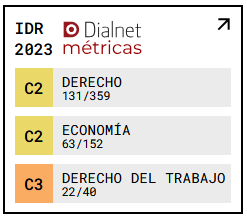Re-regulation in times of neo-liberalism?
The German experience
DOI:
https://doi.org/10.18172/redsye.6089Keywords:
Deregulation, re-regulation, neo-liberalism, German labour law, workers as consumers, control of standard contracts, antidiscrimination law, temporary agency workers, implementation of labour lawAbstract
During the last 20 years there has been a lot of deregulation in Germany, but this is not the only characteristic feature of present labour relations: a right to “part-time” work was created, consumer protection rules were transferred to the employment relationship, antidiscrimination law and data protection law were established in practice, and the legal status of temporary agency workers was improved. A minimum wage was introduced. Due to the case law of the Constitutional Court, the position of the unions in the enterprise is now a better one. Recently, the legislator facilitated collective agreements getting a legally binding effect for non-members. The problem is that deregulation always works, but regulation needs specific mechanisms to be implemented.
Downloads
Downloads
Published
How to Cite
Issue
Section
License
Copyright (c) 2014 The Authors

This work is licensed under a Creative Commons Attribution-NonCommercial-NoDerivatives 4.0 International License.











